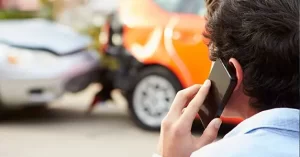Table of contents
Take care of immediate life-threatening injuries of you and your passengers
After an auto accident is very important to make sure that you and your passengers don’t have any life-threatening injuries. The sounds easy but there are severe injuries that you can get from a car accident that you may not notice immediately. These types of injuries include things like concussion, internal bleeding, broken bones, and brain injuries.
Brain hemorrhage is another type of severe injury that may be hard to detect. Sometimes this type of injury could go unnoticed because the only symptom you may have would be a headache. So, it’s not safe to assume that just because you don’t see blood or have a broken bone that you don’t have life-threatening injuries.
Make sure that you’re safe at the scene of the auto accident.
If you are involved in a car accident, your priority should be to ensure your own safety and the safety of others involved in the accident. Here are some steps you should follow:
Check for injuries:
First, assess yourself and any passengers in your vehicle for injuries. If you or anyone else is seriously injured, call emergency services immediately for medical assistance.
Move to a safe location:
If the accident is minor and there are no serious injuries, move your vehicle to a safe location, if possible, to avoid blocking traffic and prevent further accidents.
Call for help:
Regardless of the severity of the accident, it’s generally a good idea to call the police to report the incident. They can help manage the scene, take statements, and create an official report of the accident.
Check on other parties:
Once you’ve ensured your own safety and that of your passengers, check on the occupants of the other vehicles involved in the accident, if there are any. Offer assistance if needed but avoid moving injured individuals unless they are in immediate danger (e.g., from fire or oncoming traffic).
Exchange information:
While you’re waiting for the police to arrive, exchange contact and insurance information with the other drivers involved in the accident. Be polite and cooperative, but avoid discussing fault or apologizing, as it may be misinterpreted as an admission of guilt.
Document the scene:
If it’s safe to do so, take photos of the accident scene, the damage to vehicles, and any relevant road signs or traffic signals. This documentation can be valuable when dealing with insurance claims or legal matters.
Notify your insurance company:
As soon as possible, report the accident to your insurance company and provide them with all the necessary information and documentation.
Remember, if there are serious injuries or extensive property damage, it’s essential to wait for the police to arrive and handle the situation. Additionally, if you’re unsure about any aspect of what to do after an accident, seeking legal advice or consulting with an accident attorney can be helpful. Laws and regulations can vary by jurisdiction, so it’s important to understand the specific requirements in your area.
Make sure to call a doctor that treats car accident injuries!
Not every medical doctor is going to be able to take care of injury sustained in an automobile crash. Certain injuries require certain specialties. If you have a broken bone of course record to see an orthopedist or orthopedic surgeon. However, if you have a concussion you want to see a neurologist and specifically one that specializes in brain trauma. Furthermore, if you have whiplash or other soft tissue injuries you would want to see a chiropractor who specializes in post-auto accident soft tissue injury and repair.
Sometimes the healing process after an accident may not be immediate and quick. Brain injuries and soft tissue trauma may cause lingering pain for four months and maybe even years. It is very important to immediately after the accident seek care and start the healing process immediately. The more time that passes between the accident and treatment the more intimate decreases the body’s ability to prepare fully.
Seek proper legal counsel for personal injury!
It is important to know that surviving a car accident requires work. What I mean by that is to survive a car accident you want your life to be just like it was before the accident even happened. Physically and financially, you need to make sure that you have everything covered.
And so that the accident doesn’t affect your life four years down the road. Proper legal counsel can help you avoid a lot of problems and pitfalls that people will experience when dealing with insurance companies and medical billing.
Very rarely in my 20 years of working with car accident victims have I seen car damage and bodily injuries get resolved immediately with no problems. It is better to seek the counsel of professionals that have dealt with these conditions for years and have your best interest first.
Take precautions not to get in another car accident
This of course sounds like a no-brainer! But we see this day in and day out. Distracted driving by eating or cell phone conversation and texting are horrible practices. Take the time to learn from an accident. Sometimes you need to change your driving habits. Even though you might not have been the cause of the accident, by driving more alert, you may help avoid an accident. It is much better to be a defensive driver and make it home alive than trying to finish a text and not making it all.
All too often after a crash has happened victims may receive more injury by not being alert about their surroundings. A sudden car wreck can leave people confused and disoriented. So, they are not fully aware of what’s happening around them. In this state it is easy for another accident to happen. More injuries can occur from carelessly walking around the incident scene.
Or even worse, another vehicle crashing into the existing accident scene. It is a safe practice to stay inside your car until you know that it is safe to exit. If you feel lightheaded or are bleeding is safer to stay seated and still in your car as long as there’s not an immediate threat like a fire. Exiting a crashed car quickly could lead to fainting due to shock.




 Since 2012, Accident Doctor has been dedicated to connecting personal injury patients and attorneys with qualified physicians who specialize in treating accident-related injuries. Our nationwide network includes experienced medical professionals who provide care for individuals involved in car accidents, motorcycle accidents, truck and tractor-trailer collisions, slip and fall incidents, and workers’ compensation cases.
Since 2012, Accident Doctor has been dedicated to connecting personal injury patients and attorneys with qualified physicians who specialize in treating accident-related injuries. Our nationwide network includes experienced medical professionals who provide care for individuals involved in car accidents, motorcycle accidents, truck and tractor-trailer collisions, slip and fall incidents, and workers’ compensation cases.